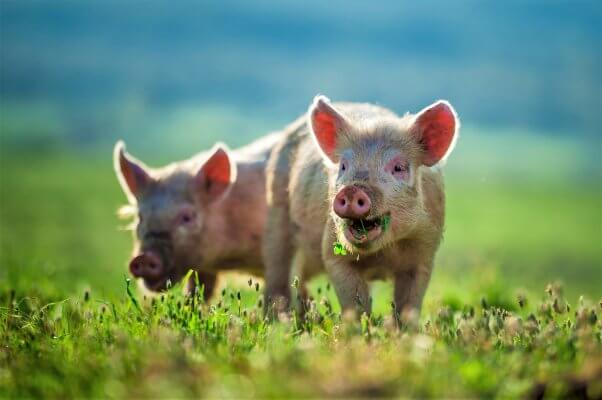Grocery stores carry an array of great-tasting “accidentally vegan” food, including some items that you might not know are animal-free. “Accidentally vegan” foods weren’t created for vegans but just happen to be free of cruelly derived ingredients—meaning there’s no meat, eggs, dairy (i.e., the mammary secretions from cows or other animals), honey, or anything else that was stolen from an animal.
Please note that this list of “accidentally vegan” products isn’t comprehensive—and it only applies to U.S.-based products, as ingredients can vary by region. Companies frequently change their formulations, so be sure to read labels prior to purchasing.
- Bisquick
- Campbell’s Mushroom Gravy
- Cap’n Crunch
- Chex Mix
- Cracker Jack
- Doritos Spicy Sweet Chili Tortilla Chips
- Dum-Dums
- Fritos
- Fruit by the Foot
- Ghirardelli Premium Hot Cocoa
- Hershey’s Chocolate Syrup
- Lay’s Barbecue Flavored Chips
- Lotus Biscoff Cookies
- Marie Callender’s Pies (Apple Crumb Cobbler, Blueberry, Cherry Crunch, Dutch Apple, Lattice Apple, Lattice Cherry, Lattice Peach, Peach Cobbler, Razzleberry Fruit, and Strawberry Rhubarb Streusel)
- Pillsbury Crescent Rolls
- Smucker’s Uncrustables
- Thomas’ Bagels
How Do I Find ‘Accidentally Vegan’ Foods?
If you think a product might be “accidentally vegan,” just look at the ingredients list. Keep an eye out for meat extracts, eggs, milk, or honey—cows, chickens, bees, and other animals are exploited and killed to produce these ingredients, so you’ll want to steer clear of them. Here’s a brief list of ingredients to flag for easier label scanning.
- Milk, casein, lactose, and whey: A mother cow’s milk is meant for her babies, but the dairy industry steals it to make these items.
- Eggs: Chickens are inquisitive individuals who love to stretch their wings in the sun.
- Honey and beeswax: Bees are smart, social animals who work hard to produce honey and beeswax in order to feed and support their hives.
- Lard: Pigs are playful and friendly, and they don’t want to die so you can eat foods that contain fat from their bodies.
- Gelatin: Skin, tendons, bones, and other body parts from cows and pigs are used to create gelatin.
- Confectioner’s glaze/shellac: This is made from the bodies of crushed-up female lac insects.
- Vitamin D3: Some products may use a vegan version of this vitamin, but many times it’s extracted from sheep’s wool or fish oils.
- Carmine: This red food coloring is extracted from crushed-up female cochineal insects. It may also be called “natural red 4.”
If you’re not sure how a certain ingredient is obtained, reach out to the company to confirm.
What About the ‘May Contain’ Warning?
The “may contain” statement at the end of a product’s ingredients list is simply a notice that the item may have been exposed to an allergen during its production. The statement’s main purpose is to help consumers with severe allergies avoid a potentially life-threatening exposure—but it doesn’t mean that eggs, milk, or any other animal-derived ingredients are actually present.
While PETA supports being vegan, we put the task of vigorously reducing animal suffering ahead of personal purity. Shunning products that are 99% or more vegan but may contain trace amounts of animal-derived ingredients sends the message to manufacturers that there’s no market for these foods—and that ends up hurting more animals. For a more detailed explanation of PETA’s position, please click here.
If you’re not vegan yet, we have just the thing for you: our free vegan starter kit, with tips and information about going vegan. For animals, the environment, and your health, order one today:



